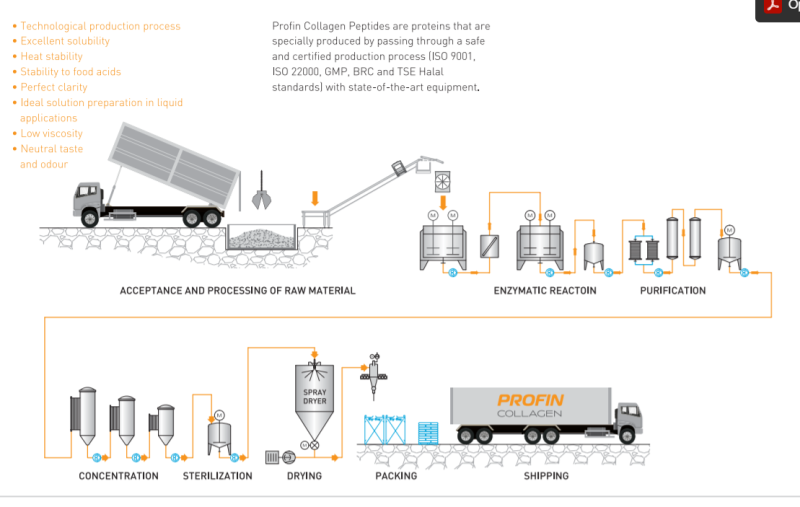Enhanced TDS
Knowde-enriched technical product data sheet
Identification & Functionality
- Ingredient Name
- Protein Type
- Food Ingredients Functions
- Pharma & Nutraceuticals Functions
- Ingredients
- Collagen
- Technologies
- Product Families
Features & Benefits
- Food Ingredients Features
- What is Collagen?
It can be also considered as a kind of “glue” because of its name derived from the word “kólla”, which means “glue”. It is one of the most important building blocks of almost every organ including bones, skin, muscle, tendon and ligament, even the eyes and teeth.
- What Are the Benefits of Collagen?
It beautifies the skin.
It reduces the signs of aging and helps to look younger. When there is enough amount of it in the skin, it guarantees brighter and lively skin. It prevents wrinkles, loosenings that are occurring on the skin with aging, and skin drynesses.
It improves bone and joint health.
Bones mainly consist of collagen and calcium. These two substances make bones both strong and flexible. Collagen also allows various joints, such as knees, hips, shoulders to move with fluidity. The main function of a joint is to connect two or more bones; but this will be painful without cartilage, ligaments, and tendons. Collagen is the main component of all these connective tissues.
It strengthens nails, hair and teeth.
It is the building block of nails, hair and teeth. It prevents hair loss and strengthens nails. It is also effective in dental health. It reduces the risks such as gingival recession, gingival bleeding.
It creates healthy hair.
It enables healthier and stronger hair follicles to grow. It helps to have bushy and bulky hair. At the same time, it treats problems such as hair loss, hair thinning.
- What Does Collagen Do?
There are 28 types of known collagen. The three main types are; 1, 2 and 3. These types of collagens make up about 80-90% of the total protein in our body.
Type 1: It makes up the majority of collagen in the body.
It provides structure for the skin, bones, tendons, connective tissue and teeth.Type 2: It is located in padded elastic cartilage.
It helps cartilage formation in connective tissues and protects joint health.Type 3: It supports the structure of muscles, organs and arteries. It gives the skin flexibility and tightness.
As we age, the body produces less and lower quality collagen. Less elasticity of the skin is one of the most prominent features of collagen deficiency. Bone and cartilage tissue also begin to weaken due to amount of collagen, which becomes insufficient as the age gets older. Injuries and mutilations are seen more common.
Collagen has many functions, not only one. Its main task is to provide tissual support to the body and to give the skin structural strength, flexibility and tightness. Its another task is to help keeping tissues and organs alive and flexible.
Applications & Uses
- Why Should You Use Profin Collagen Peptides?

- Applications
Collagen peptides can be used in different beverage applications such aswater beverages, carbonated beverages and drinkable yogurt or wheybeverages up to 25% concentrations.
Profin Collagen Peptides offer a wide range of possibilities to produce barswith different and special textures. It is possible to produce all high protein.cereal or fruit bars with collagen peptides.
Collagen peptide powder can also be combined with micronutrients such asvitamins and minerals. Long stability tests for powder mixtures haveproven that all components are stable for at least 3 years.
In fermented products such as yogurt or alcoholic beverages, collagen peptides do not affect the fermentation process up to 5% concentration. Itis convenient to combine collagen peptides with ferments and it reveals theperfect sensorial profile and texture of the food. Therefore, collagen peptides can be added before or after fermentation as required by the production process.
Collagen peptides offer comfortable use in the jelly and confectionery industries. Thanks to collagen peptides, confectionery products with increased protein content can be produced.